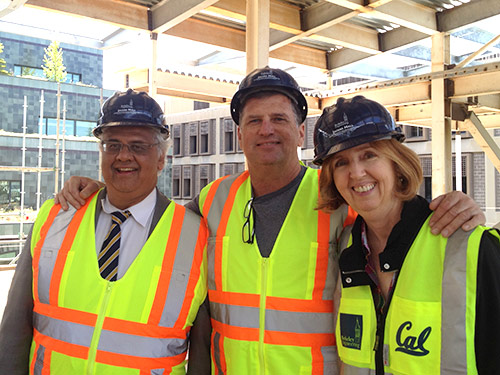Modern-day Edison creates design innovation fund
Walk into Jack McCauley’s (B.S.’86 EECS) office, and you’ll see some of the rewards that come from being an engineering wizard. On the wall is a framed 1969 certificate from Tinker Toys, proclaiming the nine-year-old McCauley a master “Toy Tinkerer” and promising a $1,000 scholarship in savings bonds. Next to that hang some of the dozen or more patents he’s earned in the intervening years. And then there’s the collection of six colorful electric guitars, signed by Black Label’s Zakk Wylde, Metallica’s Kirk Hammett and Flea of the Red Hot Chili Peppers, among others.
McCauley is currently president of R0R3 Devices, an incubator lab based in Livermore that brings clients’ ideas into the mass market. But he’s been a lifelong tinkerer, inventor and modern-day Edison whose inventions have spanned several disciplines and industries.

Jack McCauley (center) with his wife, Eileen, and Dean Shankar Sastry at the soon-to-be-completed Jacobs Hall. (Photo by Annie Averitt)
He is perhaps best known for inventing the first scrolling feature of the computer mouse and for engineering the Guitar Hero video game series. He was also chief developer of several virtual reality technologies for gaming, including the Oculus Rift VR headgear, and was one of the originators of the Universal Serial Bus (USB) port standard for computer peripherals. As an expert in microelectromechanical systems (MEMS), he pioneered use of MEMS technology in the gaming industry.
Game-changer
With a father in the military, McCauley grew up in the Netherlands before moving to the East Bay. He loved taking things apart from an early age, building them into something new, exploring everything from basic spatial relationships to electronics. His natural intelligence and curiosity didn’t serve him well in school, however. “The material was too easy, and I was always bored,” he remembers.
McCauley felt the same way starting out at Diablo Valley College, but his natural talent was so obvious that he was offered a job as a nuclear power engineer with the Department of Defense (DOD). The DOD was impressed enough with his work that it offered McCauley a full scholarship to Berkeley Engineering, where he studied electronics and circuit theory and received his bachelor’s degree in electrical engineering and computer sciences in 1986.
Berkeley was a game-changer. “Suddenly, I had to learn a better work ethic,” he recalls. “I had always been the best student in all my classes. Now I was somewhere in the middle. I took 18 units my first quarter — all programming and science courses. It just about killed me.”
It was also at Berkeley where McCauley met one of the most influential people in his professional life. Elwyn Berlekamp, now professor emeritus of mathematics and EECS, is best known for his work in coding theory and combinational game theory. After graduating, McCauley went to work for Berlekamp and his digital film encoding company, Cyclotomics, until he left to find new opportunities for invention.
Once McCauley took his digital hardware expertise out into the world, he discovered the video game industry, where he developed controls and control systems for such companies as Sony and Microsoft. RedOctane, founded by Berkeley alumni, contacted him with its idea to convert a guitar into a game controller, so McCauley reverse-engineered a plastic guitar while RedOctane wrote a demo game. Over time, Guitar Hero sold about 50 million units.
McCauley went on to become the designer of wildly popular video game peripherals for titles such as Grand Theft Auto, Forza Motorsport, Dance Dance Revolution and Gran Turismo. Then, in 2011, he joined Oculus and began working on the first version of the Oculus Rift. The product was launched with a Kickstarter campaign, and within three years was sold to Facebook for $2 billion. But ask McCauley about his greatest professional achievements, and he says he’s most proud of his work on digital sound systems for movies, for which he built the hardware and wrote an early version of a digital simulator for sequential logic to simulate sound systems.
Reconnecting
In 2014, McCauley accepted an invitation to give the inaugural lecture of the Berkeley Innovators lecture series on campus. The design mastermind had lost touch with Cal in the previous decades, but the reconnection led him to become involved with SkyDeck/Berkeley, the university-affiliated business accelerator. He is proud to be able to reach back and help new generations of engineering students at his alma mater.
McCauley’s return to Berkeley has inspired him to give back in other ways. He and his wife, Eileen Larkin McCauley (B.A.’82 English), have made a $2.5-million gift to establish the McCauley Family Fund in Design Innovation.
For all his successes as an engineer, a designer and an inventor, McCauley simply considers himself a creative person, one driven equally by curiosity and the drive to solve problems. His advice to future generations of engineers? “In order to be in the band, you have to play an instrument,” he says. “That’s why I went to Cal — I wanted to learn those skills. Just learn your instrument.”
